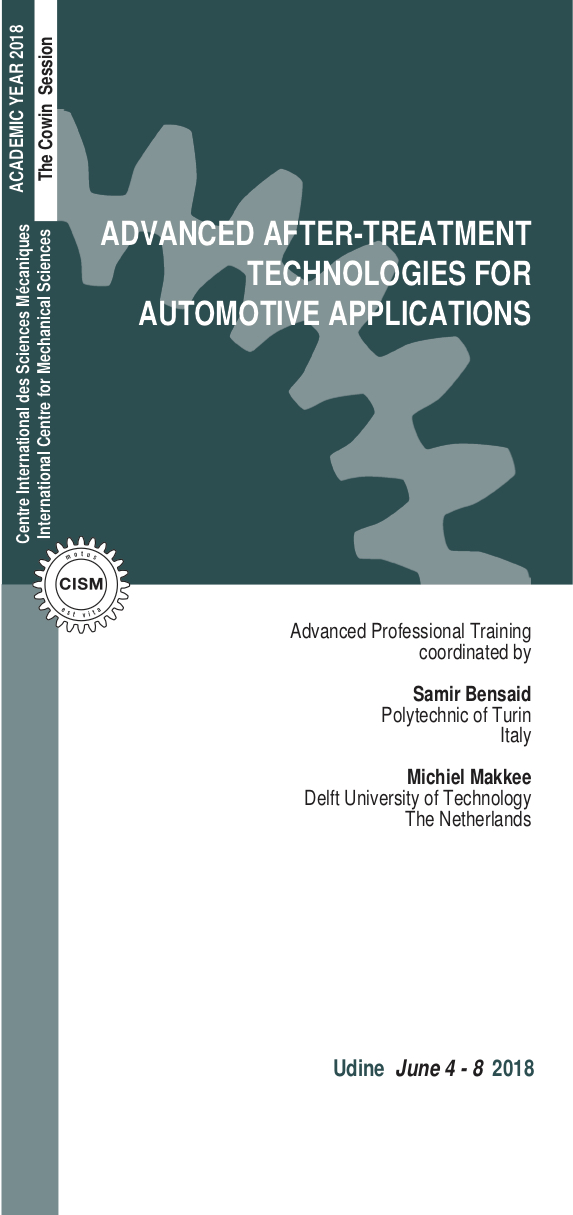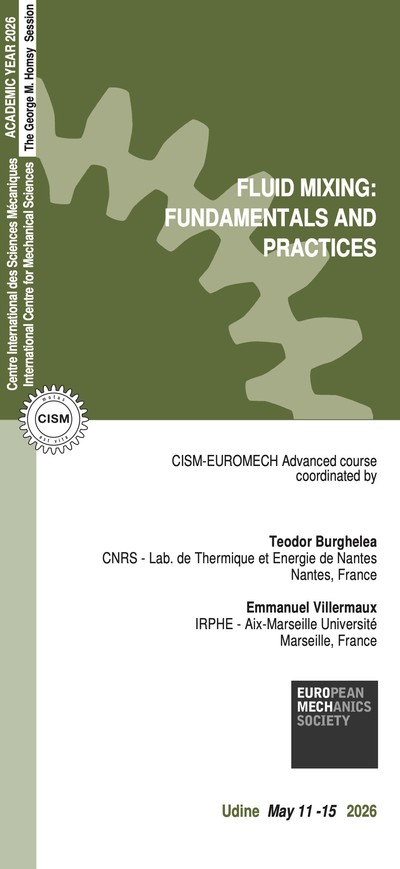The Course on “Advanced after-treatment technologies for automotive applications” gathers worldwide renowned scientists and technologists, in order to provide a comprehensive picture of current challenges and solutions related to automotive-related air pollution. Moreover, the Course delivers fundamental knowledge on the involved complex phenomena, from the aftertreatment line scale down to the catalyst scale. The Course starts with an introduction having an engine-directed perspective, in order to describe the mechanisms of pollutant generation, the control of the engine to minimize them, and the developments driven by law regulations. Subsequently, the catalytic converters are individually considered: firstly, the oxidation of gaseous pollutants from either gasoline (TWC) or diesel (DOC) engines exhausts in structured reactors is described. Then, the abatement of soot within Particulate Filters is tackled from an experimental and modeling point view, with a multi-scale approach: soot-catalyst interactions are specifically addressed, with a focus on mechanisms and rational catalyst design. NOx abatement, which constitutes a tremendous problem nowadays given the gap between bench and on-road performance of catalyst converters, is presented through concurrent technologies: NSR (and specifically the Di-Air technology), SCR, NSR+SCR, and ammonia slip catalysts (ASC). The mechanisms, the catalysts, and the reactor-scale management from reaction engineering perspective, are widely described. The possible combination of these different technologies will be proposed too. Finally, the perspective of a major manufacturer of catalytic converters and diesel engines is given, aiming at understanding the practical trade-offs that have to be optimized in terms of reliability, durability, cost and customer acceptance of the available technologies.
Guy B. Marin et al., Advances in Chemical Engineering, Volume 33, 1st Edition, Academic Press 2008, ISBN: 9780080557212.
Alessandro Trovarelli, Catalysis by Ceria and Related Materials Catalytic Science Series: Volume 2, ISBN: 978-1-86094-965-4, World Scientific 2002.
B.A.A.L. van Setten, M. Makkee, and J.A. Moulijn, Science and Technology of Diesel Particulate Filter, Catalysis Reviews - Science and Engineering, 43 (2001) 489-564.
M. Makkee and Y. Wang, Reaction Mechanism Study of the Di-Air System and Selectivity and Reactivity of NO Reduction in Excess O2, SAE International Journal of Engines , 10 (4) 2017 (doi:10.4271/2017-01-0910).
Egbert S. J. Lox, Automotive Exhaust Treatment, Part 11. Environmental Catalysis, 2008 Wiley-VCH Verlag GmbH & Co (doi: 10.1002/9783527610044. hetcat0120).
Samir Bensaid (Polytechnic University of Turin, Italy)
2 lectures on: TWC and DOC converters for gaseous pollutants abatement.
The principles of structured reactors, as well as the variety of catalytic formulations for the oxidation of HC, CO and NO in both gasoline (Three Way Catalysts – TWC) and diesel (Diesel Oxidation Catalysts – DOC) engine exhaust gases aftertreatment, will be presented.
Agustin Bueno-Lopez (University of Alicante, Spain)
5 lectures on: Soot oxidation catalysis.
The catalysis of soot abatement, in tight connection with the filter regeneration strategies, will be discussed: the different active species used in real applications and studied at laboratory will be screened, and the soot combustion mechanisms will be explained.
Michael Harold (University of Houston, USA)
6 lectures on: NSR, SCR, and ammonia slip catalysts and systems for NOx abatement.
NOx storage and reduction (NSR), selective catalytic reduction (SCR), and ammonia slip catalyst (ASC) systems for lean-burn diesel engines will be described through both experimental and modeling activities to elucidate NSR and SCR, as well as NSR + SCR multi-functional catalyst architectures.
Athanasios G. Konstandopoulos (None)
6 lectures on: Diesel and Gasoline Particulate Filters dynamics.
The dynamics of particulate filters for diesel (DPF) and gasoline (GPF) systems are covered, drawing on fundamentals from various branches of applied sciences such as porous media, filtration and materials sciences, as well as computer simulation techniques.
Michiel Makkee (Technical University of Delft, Netherlands)
5 lectures on: NSR catalysts, and specifically Di-Air technology, for NOx abatement.
NOx Storage and Reduction (NSR) systems, and in particular the Di-Air (Diesel NOx after treatment by Adsorbed Intermediate Reductants) system, will be explained in terms of the individual roles the catalyst components (e.g., NOx reduction, hydrocarbon activation and oxidation).
Federico Millo (Polytechnic University of Turin, Italy)
6 lectures on: Pollutants generation and engine control.
Primary and secondary pollutants, geographical impact scales, impact of the transportation sector, health effects are addressed. The strategies for in-cylinder emission control will complete the overview on engine-oriented perspective of the problem.
Aleksey Yezerets (Cummins Inc., USA)
5 lectures on: Design of aftertreatment converters with commercial catalytic systems.
The focus will be on the remarkable variety of aftertreatment system-level solutions that have been put into practice, reflecting a broad range of scientific, engineering and commercial tradeoffs which must be addressed to create a system capable of maintaining high efficiency across a broad range of operating and aging conditions.
The registration fee is 600.00 Euro + VAT*, where applicable (bank charges are not included). The registration fee includes a complimentary bag, four fixed menu buffet lunches (on Friday upon request), hot beverages, downloadable lecture notes and wi-fi internet access. Applicants must apply at least one month before the beginning of the course. Application forms should be sent on-line through the following web site: http://www.cism.it. A message of confirmation will be sent to accepted participants. Applicants requiring assistance with the registration should contact the secretariat at the following email address cism@cism.it. Applicants may cancel their course registration and receive a full refund by notifying CISM Secretariat in writing (by email to cism@cism.it) no later than two weeks prior to the start of the course. Cancellation requests received during the two weeks prior to the start of the course will be charged a 50.00 Euro handling fee. Incorrect payments are also subject to a 50.00 Euro handling fee. A limited number of participants from universities and research centres who are not supported by their own institutions can be offered lodging and/or board, if available, in a reasonably priced hotel or student guest house. Requests should be sent to CISM Secretariat by
March 4, 2018 along with the applicant's curriculum and a letter of recommendation by the head of the department or a supervisor confirming that the institute cannot provide funding. Preference will be given to applicants from countries that sponsor CISM. Information about travel and accommodation is available on the web site www.cism.it, or can be mailed upon request.
* Italian VAT is 22%.





